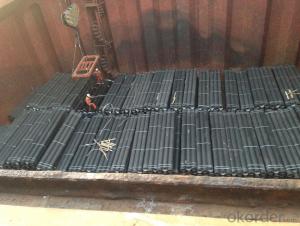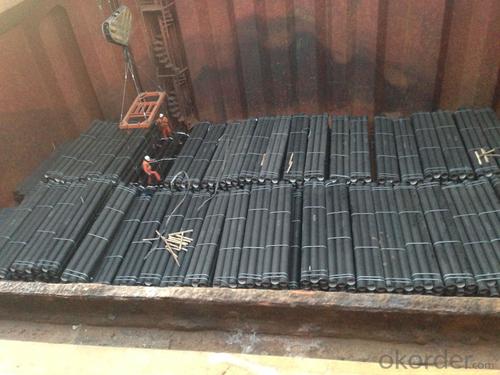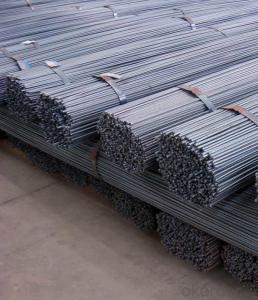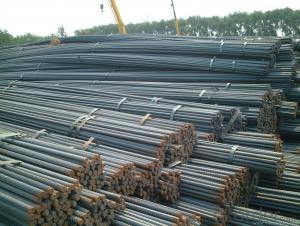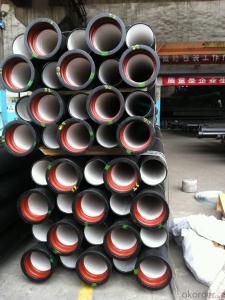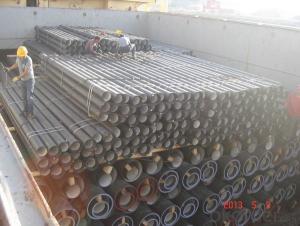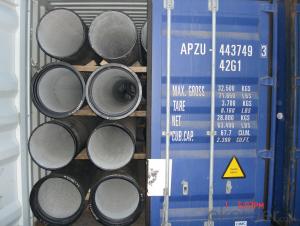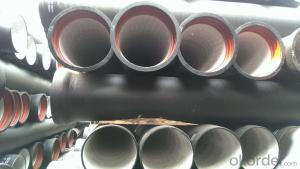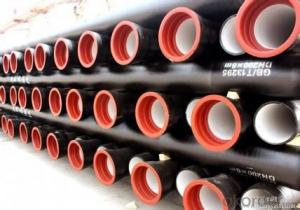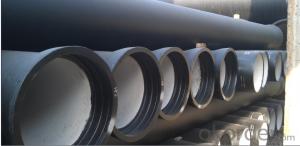DUCTILE IRON PIPE K8 DN 200 SOCKET SPIGOT PIPE
- Loading Port:
- Tianjin
- Payment Terms:
- TT OR LC
- Min Order Qty:
- 25 m.t.
- Supply Capability:
- 30000 m.t./month
OKorder Service Pledge
OKorder Financial Service
You Might Also Like
1) The standard of pipe: ISO2531:1998, EN545:2006,K9 K8
2) Effective length: 6m/5.7m
3) Inner cement line: Portland cement lineas per ISO4179
4) Zinc coating: at least 130g/m2 as per ISO8179
5) Bitumen painting: at least 70μm as per ISO8179
6)With 102% quantity of NBR, SBR, or EPDM ring asper ISO4633
7) DN80-DN1200
8) Highstrength, lighter than grey iron, good corrosion resistance, no furring, smallflow resistance, easy fixing, long life tome about 100 yeas
9)Checked by automatic inspection equipment
10) Composition:
Chemical composition | |||
Chemical composition | Ductile Cast Iron Pipe (%) | Grey iron pipe (%) | Steel pipe (%) |
C | 3.5-4.0 | 3.2-3.8 | 0.1-0.2 |
Si | 1.9-2.6 | 1.4-2.2 | 0.15-0.4 |
Mn | 0.15-0.45 | 0.4-0.6 | 0.3-0.6 |
P | ≤0.06 | ≤0.3 | 0.02-0.03 |
S | ≤0.02 | ≤0.1 | 0.02-0.03 |
Mg | 0.03-0.06 |
|
|
11) Feature:
Mechanical properties | |||
| Ductile Cast Iron Pipe | Grey Iron Pipe | Steel Pipe |
Tensile Strength(Mpa) | ≥420 | 150-260 | ≥400 |
Yield Strength(Mpa) | ≥300 | No Confirmation | No Confirmation |
Bending Strength(Mpa) | ≥590 | 200-360 | ≥400 |
Elongation (%) | ≥10 | Neglected | ≥18 |
Brinell Hardness(HBS) | ≤230 | ≤230 | About 140 |
12) T type mechanical joint
13) Packing: in bulk or container
PACKING: 1) Pipesare bundled together with the steel belt.
2) Wooden pieces are put between the pipes.
- Q: How does ductile iron pipe perform in areas with high soil settlement?
- Ductile iron pipe is known for its exceptional performance in areas with high soil settlement. Due to its inherent strength and durability, it can withstand the pressures exerted by settling soil without compromising its structural integrity. The flexibility of ductile iron pipe allows it to accommodate ground movements caused by soil settlement, thus minimizing the risk of pipe failure or damage. Its ability to adapt to these movements helps prevent cracks, leaks, and breaks that could occur in more rigid pipe materials. Moreover, ductile iron pipe's strong resistance to corrosion provides an added advantage in high soil settlement areas. It can withstand the corrosive effects of the soil and other environmental factors, ensuring the longevity and reliability of the pipe system. In areas with high soil settlement, ductile iron pipe is often the preferred choice due to its ability to handle ground movements without sacrificing performance. Its strength, flexibility, and resistance to corrosion make it an ideal solution for maintaining a robust and efficient water distribution system even in challenging soil conditions.
- Q: What are the different types of ductile iron pipe joints?
- Various applications commonly utilize different types of ductile iron pipe joints to ensure efficient fluid transfer and prevent leaks. These joints provide strong and reliable connections between pipes. Some of the most frequently used types of ductile iron pipe joints are as follows: 1. Push-on Joint: This joint is simple to install and does not require any special tools. The spigot end of one pipe is inserted into the bell end of another pipe, creating a tight seal. A rubber gasket is typically used to enhance leak resistance. 2. Mechanical Joint: Water and wastewater applications often use mechanical joints. They consist of a gland, a rubber gasket, and a follower gland. The pipe ends are pushed into the gland, and the follower gland is tightened, compressing the rubber gasket and establishing a secure connection. 3. Restrained Joint: These joints are designed to withstand high internal and external forces, such as water pressure or soil loadings. Rubber gaskets and restraining mechanisms like bolts or wedges are commonly used to prevent pipe movement or separation under stress. 4. Flanged Joint: Large diameter pipes or applications requiring frequent disassembly often employ flanged joints. Each pipe end is equipped with a flange, which is then bolted together with gaskets to create a strong connection. Flanged joints provide convenient access for maintenance or repairs. 5. Welded Joint: Welded joints involve heating and fusing the pipe ends to form a permanent connection. This type of joint is typically used in high-pressure applications where a reliable and leak-free connection is crucial. Skilled labor and specialized equipment are required for welded joints. To ensure the integrity and longevity of the ductile iron pipe system, it is important to choose the appropriate joint based on the specific application, pipe size, and operating conditions. Consulting with a professional engineer or pipe manufacturer can help determine the most suitable joint for a particular project.
- Q: How can the ductile iron pipe elbow be fixed?
- The groove connecting pipe consists of two categories of products: sealing function of pipe connections with rigid joint, flexible joint, mechanical three and groove flange; the pipe connections transition of elbow, three links, four links, different diameter pipe, blind plate etc..
- Q: Can ductile iron pipe be used for mining applications?
- Yes, ductile iron pipe can certainly be used for mining applications. Ductile iron is a type of cast iron that exhibits significant tensile strength, flexibility, and durability, making it suitable for demanding and rugged environments like mining. Its high strength-to-weight ratio allows for easy handling and installation, making it a cost-effective choice for mining operations. Ductile iron pipes are resistant to corrosion and have excellent mechanical properties, including high impact and fatigue resistance. These properties make them ideal for transporting various materials commonly found in mining, such as water, slurries, and abrasive ores. Additionally, ductile iron pipes have a long lifespan, ensuring reliable performance and minimal maintenance requirements in mining operations. Furthermore, ductile iron pipes can withstand high pressures and maintain their integrity under extreme conditions, making them suitable for underground mining applications. They can handle the demanding requirements of deep mining operations, including the transport of water for cooling or dust suppression, as well as the drainage of wastewater or mine dewatering. Overall, ductile iron pipes provide the necessary strength, resilience, and corrosion resistance required for mining applications. Their versatility, durability, and ease of installation make them a valuable choice for mining operations, ensuring efficient and reliable material transport while minimizing downtime and maintenance costs.
- Q: Are ductile iron pipes suitable for installation in areas with high soil compaction?
- Yes, ductile iron pipes are suitable for installation in areas with high soil compaction. Ductile iron pipes have high strength and durability, allowing them to withstand the pressure exerted by compacted soil. They can effectively resist external loads and provide long-term performance, making them a reliable choice for such areas.
- Q: How can 4 inch ductile iron pipe be connected with 2 inch galvanized pipe?
- The hot dip galvanized welded steel pipe galvanized pipe, galvanized pipe by welding without taking anti rusting measures (furnace welding and welding) steel pipe, seamless steel pipe or other metal pipe of the clarinet, process of hot dip galvanizing, the outer coating and galvanized layer to long-term corrosion of the steel pipe after processing.
- Q: Can ductile iron pipes be used for water supply in buildings?
- Yes, ductile iron pipes can be used for water supply in buildings. Ductile iron pipes are known for their strength, durability, and corrosion resistance, making them suitable for a variety of applications, including water supply systems. They have a high tensile strength and can withstand high-pressure environments, making them ideal for delivering water to buildings. Additionally, ductile iron pipes have a long service life, reducing the need for frequent replacements. They also have good flow characteristics, allowing for efficient water distribution within the building. Therefore, ductile iron pipes are a reliable and commonly used choice for water supply systems in buildings.
- Q: Why does the cast iron pipe always run off when testing?
- The pipeline is installed, straight section of each pipe will be added pier, concrete pipe, elbow, three links should also have concrete pier, specific installation method according to GB Atlas 03SS515, and the straight pipe to soil, pipeline interface will be exposed, easy to check.
- Q: What is the expected deflection limit of ductile iron pipes?
- Several factors, including pipe diameter, wall thickness, and soil conditions, determine the expected deflection limit of ductile iron pipes. According to industry standards, it is recommended that ductile iron pipes used for underground installations should not exceed a deflection limit of 2%. In other words, the maximum allowable deflection would be 2% of the pipe's diameter. It is important to be aware that surpassing the deflection limit can result in various issues, such as reduced flow capacity, higher chances of pipe failure, and compromised structural integrity. Therefore, it is crucial to carefully consider and adhere to the suggested deflection limits when designing and installing ductile iron pipes to ensure their long-term performance and reliability.
- Q: Are ductile iron pipes suitable for underground installations?
- Ductile iron pipes are well-suited for underground installations. They are made from a highly sturdy and durable material that can handle the various pressures and strains commonly found in underground environments. Moreover, they possess exceptional resistance to corrosion, which makes them an excellent choice for underground applications that might expose them to moisture, soil, and other corrosive elements. Additionally, these pipes have a high tensile strength, enabling them to withstand external loads and prevent cracking or breakage caused by ground movement or heavy traffic. Furthermore, ductile iron pipes have a longer lifespan compared to other materials, making them a cost-effective option for underground installations. On the whole, ductile iron pipes are a dependable and appropriate choice for underground applications because of their durability, corrosion resistance, and long-term performance.
Send your message to us
DUCTILE IRON PIPE K8 DN 200 SOCKET SPIGOT PIPE
- Loading Port:
- Tianjin
- Payment Terms:
- TT OR LC
- Min Order Qty:
- 25 m.t.
- Supply Capability:
- 30000 m.t./month
OKorder Service Pledge
OKorder Financial Service
Similar products
Hot products
Hot Searches
Related keywords
